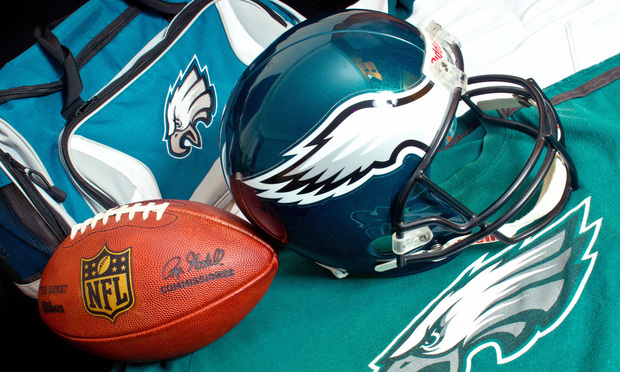Justices Sack Bid to Reinstate $700K Verdict Over Altercation at Eagles-Cowboys Game
The allocatur denial reinforces Pennsylvania's high bar for plaintiffs in premises liability cases—a bar that one Superior Court judge called "fundamentally unfair."
March 17, 2020 at 01:24 PM
5 minute read
 Philadelphia Eagles equipment. Photo: Dean Bertoncelj/Shutterstock.com
Philadelphia Eagles equipment. Photo: Dean Bertoncelj/Shutterstock.com
The Pennsylvania Supreme Court has declined to review a state Superior Court ruling that said the Philadelphia Eagles and the team's security contractor were not responsible for paying more than $700,000 to a Dallas Cowboys fan who was roughed up by Eagles fans at their home stadium.
The allocatur denial reinforces Pennsylvania's high bar for plaintiffs in premises liability cases—a bar that one Superior Court judge called "fundamentally unfair."
Patrick Pearson sued the Philadelphia Eagles LLC, the owner of the Eagles' stadium (Eagles Stadium Operators LLC), and the security agency handling public safety during the Dec. 14, 2014, Eagles-Cowboys game for negligence. Pearson went to the game decked out in Cowboys attire, and was jeered while in line for the restroom. He alleged he was subsequently attacked by unruly Eagles fans.
In a brief seeking permission to appeal to the Pennsylvania Supreme Court, Pearson argued that the Superior Court's upending of the verdict sets a dangerous precedent by imposing an unreasonable burden of proof for plaintiffs.
"The Superior Court's holding paves the way for fans of opposing teams that enter rival sporting venues in this commonwealth to become targets of assaults, physical intimidation, and abuse with impunity," Pearson's lawyer, Robert Birch, wrote in the petition for allowance of appeal. Birch declined to comment beyond the argument laid out in the document.
"The Superior Court determined that despite evidence that the Eagles had knowledge of fights and altercations fueled by intoxication in the restrooms and never came to Pearson's aid, it was Pearson's burden to show multiple assaults within some unspecified timeframe. The Superior Court never stated how many assaults would have satisfied this new burden," the petition said.
But in a one-sentence order issued March 16, the Supreme Court denied allocatur in the case.
Andrew Connolly of Post & Schell, who represents the defendants, declined to comment on the allocatur denial. Colmar-based solo attorney Birch could not immediately be reached for comment.
In a published Oct. 11 ruling, a three-judge Superior Court panel vacated the $700,000 award handed down by a Philadelphia jury, rejecting Pearson's argument that the defendants were negligent because there was no guard posted at the restroom.
Pearson had attempted to rely on the state Supreme Court's 1984 ruling in Feld v. Merriam, which held that property owners are liable to business invitees for harm caused by the foreseeable criminal actions of third parties if the property owner agreed to undertake or voluntarily undertook a duty to provide such protection.
"Where a property owner knows or has reason to know, from past experience, that there is a likelihood of conduct on the part of third persons that would harm invitees, the property owner 'may be under a duty to take precautions against it, and to provide a reasonably sufficient number of servants to afford a reasonable protection,'" Superior Court Judge Mary Murray wrote in the court's majority opinion. "In this case, however, the record does not support the trial court's conclusion that appellants were on notice that violent assaults regularly took place in the stadium's restrooms or that appellants conducted their security program without reasonable care."
Murray was joined by Senior Judges Eugene Strassburger III and Dan Pellegrini.
But Strassburger penned a concurring opinion "to reiterate what I have noted for 25 years: Pennsylvania law in the area of premises liability is fundamentally unfair to injured customers."
Quoting from his own concurring opinion in the 2012 case Goodman v. Chester Downs and Marina, Strassburger said, "'Equitable considerations should allow a plaintiff to recover under factual situations such as this. Where a customer has sustained injuries although neither the customer nor the [business] has behaved negligently, it would be more fair to hold the [business] responsible than to place the risk on the consumer. [Injuries] such as these are foreseeable risks of conducting this type of business, and commercial businesses are in a far better financial position to absorb the cost by spreading the risk among thousands of customers.'"
After the incident, Pearson was sent to the hospital for a fractured ankle, which required two surgeries. In his claims against the security company, Apex, Pearson alleged the agency negligently failed to properly ensure the safety of attendees.
Philadelphia Court of Common Pleas Judge Teresa Sarmina previously urged the Superior Court to affirm her denial of the defendants' request to vacate the judgment.
"It is foreseeable that, at a sporting event, when fans are drinking and engaging in enthusiastic banter and cheering for their teams, tensions may run high," Sarmina said in her opinion. "This was actually anticipated by defendant Apex, which had deployed undercover operatives wearing jerseys like appellee's throughout the stadium on the day appellee was attacked, to identify Eagles fans who were harassing fans of the opposing team."
She continued, "It was foreseeable that altercations could take place in the bathroom, and appellants own agent was aware of this, as evidenced by … testimony at trial. It was reasonable for the jury to conclude that, because appellant failed to provide a safe environment to appellee, and because he was attacked in one of the blind spots to the security provided—the bathroom—his injuries were proximately caused by their negligence."
But Murray said the fact that Apex deployed undercover operatives to quell potential altercations between Eagles and Cowboys fans showed that the company "both recognized this danger and addressed the issue." Murray added that the record showed that violent altercations specifically in the stadium bathrooms were actually rare occurrences.
This content has been archived. It is available through our partners, LexisNexis® and Bloomberg Law.
To view this content, please continue to their sites.
Not a Lexis Subscriber?
Subscribe Now
Not a Bloomberg Law Subscriber?
Subscribe Now
NOT FOR REPRINT
© 2025 ALM Global, LLC, All Rights Reserved. Request academic re-use from www.copyright.com. All other uses, submit a request to [email protected]. For more information visit Asset & Logo Licensing.
You Might Like
View All


Pa. Superior Court Rules Pizza Chain Liable for Franchisee Driver's Crash
4 minute read
Trending Stories
- 1Thursday Newspaper
- 2Public Notices/Calendars
- 3Judicial Ethics Opinion 24-117
- 4Rejuvenation of a Sharp Employer Non-Compete Tool: Delaware Supreme Court Reinvigorates the Employee Choice Doctrine
- 5Mastering Litigation in New York’s Commercial Division Part V, Leave It to the Experts: Expert Discovery in the New York Commercial Division
Who Got The Work
J. Brugh Lower of Gibbons has entered an appearance for industrial equipment supplier Devco Corporation in a pending trademark infringement lawsuit. The suit, accusing the defendant of selling knock-off Graco products, was filed Dec. 18 in New Jersey District Court by Rivkin Radler on behalf of Graco Inc. and Graco Minnesota. The case, assigned to U.S. District Judge Zahid N. Quraishi, is 3:24-cv-11294, Graco Inc. et al v. Devco Corporation.
Who Got The Work
Rebecca Maller-Stein and Kent A. Yalowitz of Arnold & Porter Kaye Scholer have entered their appearances for Hanaco Venture Capital and its executives, Lior Prosor and David Frankel, in a pending securities lawsuit. The action, filed on Dec. 24 in New York Southern District Court by Zell, Aron & Co. on behalf of Goldeneye Advisors, accuses the defendants of negligently and fraudulently managing the plaintiff's $1 million investment. The case, assigned to U.S. District Judge Vernon S. Broderick, is 1:24-cv-09918, Goldeneye Advisors, LLC v. Hanaco Venture Capital, Ltd. et al.
Who Got The Work
Attorneys from A&O Shearman has stepped in as defense counsel for Toronto-Dominion Bank and other defendants in a pending securities class action. The suit, filed Dec. 11 in New York Southern District Court by Bleichmar Fonti & Auld, accuses the defendants of concealing the bank's 'pervasive' deficiencies in regards to its compliance with the Bank Secrecy Act and the quality of its anti-money laundering controls. The case, assigned to U.S. District Judge Arun Subramanian, is 1:24-cv-09445, Gonzalez v. The Toronto-Dominion Bank et al.
Who Got The Work
Crown Castle International, a Pennsylvania company providing shared communications infrastructure, has turned to Luke D. Wolf of Gordon Rees Scully Mansukhani to fend off a pending breach-of-contract lawsuit. The court action, filed Nov. 25 in Michigan Eastern District Court by Hooper Hathaway PC on behalf of The Town Residences LLC, accuses Crown Castle of failing to transfer approximately $30,000 in utility payments from T-Mobile in breach of a roof-top lease and assignment agreement. The case, assigned to U.S. District Judge Susan K. Declercq, is 2:24-cv-13131, The Town Residences LLC v. T-Mobile US, Inc. et al.
Who Got The Work
Wilfred P. Coronato and Daniel M. Schwartz of McCarter & English have stepped in as defense counsel to Electrolux Home Products Inc. in a pending product liability lawsuit. The court action, filed Nov. 26 in New York Eastern District Court by Poulos Lopiccolo PC and Nagel Rice LLP on behalf of David Stern, alleges that the defendant's refrigerators’ drawers and shelving repeatedly break and fall apart within months after purchase. The case, assigned to U.S. District Judge Joan M. Azrack, is 2:24-cv-08204, Stern v. Electrolux Home Products, Inc.
Featured Firms
Law Offices of Gary Martin Hays & Associates, P.C.
(470) 294-1674
Law Offices of Mark E. Salomone
(857) 444-6468
Smith & Hassler
(713) 739-1250





